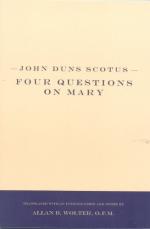|
This section contains 9,203 words (approx. 31 pages at 300 words per page) |

|
SOURCE: Dumont, Stephen D. “Theology as a Science and Duns Scotus's Distinction between Intuitive and Abstractive Cognition.” Speculum 64, no. 3 (July 1989): 579-99.
In the following essay, Dumont probes the distinction between two types of thought—intuitive and abstractive cognition—within Scotus's definition of theology as a true science rather than simply the product of faith and beatific vision.
By all accounts one of the most influential philosophical contributions of Duns Scotus is his distinction between intuitive cognition, in which a thing is known as present and existing, and abstractive cognition, which abstracts from actual presence and existence.1 Recent scholarship has focused almost exclusively on the role given intuitive cognition in the justification of contingent propositions and on the debates over certitude which arose from the critiques of Scotus's distinction by Peter Aureoli and William of Ockham.2 However warranted this focus on the problem of certitude and the role of...
|
This section contains 9,203 words (approx. 31 pages at 300 words per page) |

|


